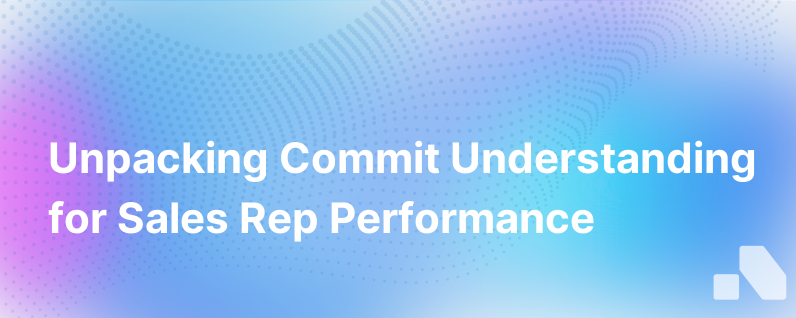Do Your Sales Reps Know What A Commit Really Means 1
Published on January 6, 2024 by David Zhang
In the high-stakes arena of B2B sales, the term 'commit' holds a profound significance. It is a word that denotes more than mere intention; it is a promise, a bold claim by sales representatives that they will turn an opportunity into a closed deal within a designated timeframe. A sales commit speaks volumes, reflecting on the rep's credibility, forecasting accuracy, and their understanding of the customer's buying journey.
However, amidst the relentless pressure to meet quotas and the intense drive to succeed, do sales reps truly grasp the weight of a commit? This article will delve into this crucial question, exploring the implications for sales organizations, how to ensure that commitments are understood and honored, and the repercussions of a casual approach to making commitments.
The Importance of Accurate Commitments
Sales commitments are a pivotal component of any sales operation. They are the north star for forecasting, planning, and revenue expectations. When sales reps communicate their commits, management teams rely on these figures to make critical business decisions—budget allocations, resource distribution, and even public revenue projections for publicly listed companies.
Yet, the classification of an opportunity as a 'commit' should never be taken lightly. A sales commitment must be the culmination of rigorous analysis and a deep understanding of where a prospect is in the buyer's journey. It needs to be rooted in concrete evidence and a firm belief in the deal's closure.
The Misalignment of Sales Commitment Understanding
The crux of the issue often lies in a misalignment between what sales management perceives as a 'commit' and the rep's personal interpretation. For a rep, a commit might be aspirational—a deal they are striving to close and feel reasonably confident about. But for sales leadership, a 'commit' is a solid assurance, almost as good as revenue in the bank.
Training Sales Reps on the Gravity of a Commit
To bridge this understanding gap, companies must institute robust training programs that emphasize the gravity of sales commitments. These programs should educate sales teams on the tangible impacts of over-promising, including the potential to erode trust with clients and disrupt internal operations.
Identifying a Solid Commit
Effective training hinges on teaching sales reps how to identify when an opportunity is mature enough to be classified as a commit. Reps should be adept at evaluating the viability of a deal based on various factors:
- Customer Verbal Confirmation: The prospect should have expressed a clear intent to buy within a defined period.
- Budget Approval: Ensure that the prospect has the budget allocated for the purchase.
- Decision-Maker Buy-In: The key stakeholders who have the power to greenlight the deal must be on board.
- Defined Timeframe: A specific close date should be established, which aligns with the prospect's purchasing process.
- Obstacle Assessment: All major hurdles to the deal closing should have been identified and a plan in place to overcome them.
The Art of Communication
Beyond identifying a solid commit, sales reps must also master the art of communicating their commitments effectively. This means being transparent about the factors that contribute to their confidence level and openly discussing the risks and variables involved. Communication channels must always be open with management, especially if circumstances change.
Accountability in the Sales Process
An environment that fosters accountability is pivotal. Reps must feel a personal responsibility for their commits, knowing that their professional reputation and the company's financial health are interlinked with the promises they make.
Metrics and Analysis
Data and metrics play a fundamental role in shaping a more accurate sales commit process. Companies should employ rigorous analytical tools to track the progression of deals, using historical data to better understand patterns and predict outcomes. This information can provide sales reps with clear guidelines on when it is appropriate to commit.
The Impact of Aomni on Commit Accuracy
In the context of advanced B2B sales platforms like Aomni, the rudimentary guesswork traditionally associated with sales commits is replaced with data-driven precision. Aomni streamlines the account research process, delivering real-time insights that empower sales reps to make informed commitments without extensive manual effort.
With actionable competitive intelligence at their fingertips, reps using Aomni can rapidly adapt to changes in the sales landscape, ensuring that commit designations are always reflective of the current reality. The AI-driven analysis helps reduce the uncertainty that often plagues sales forecasting, ultimately leading to a more predictable and reliable commit process.
Closing Thoughts
Understanding the true meaning of a sales commit is essential for preserving the integrity of the sales process and the trust between sales reps and management. Ensuring that commits are made with due diligence and communicated accurately is paramount. The right tools and training empower sales teams to deliver more than just numbers—they provide a foundation of trust and accountability that sustains the long-term health of the business.
As sales landscapes grow increasingly complex, leveraging intelligent platforms like Aomni confirms that companies are not simply keeping pace but are setting the pace, instilling a culture that understands the full weight of a 'commit' in the sales world. This is the bedrock upon which successful sales organizations are built and sustained.